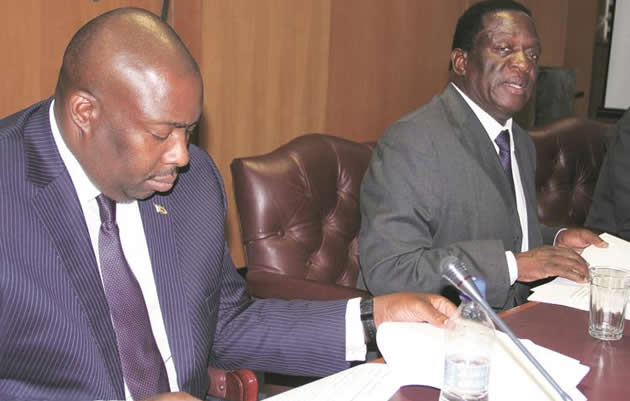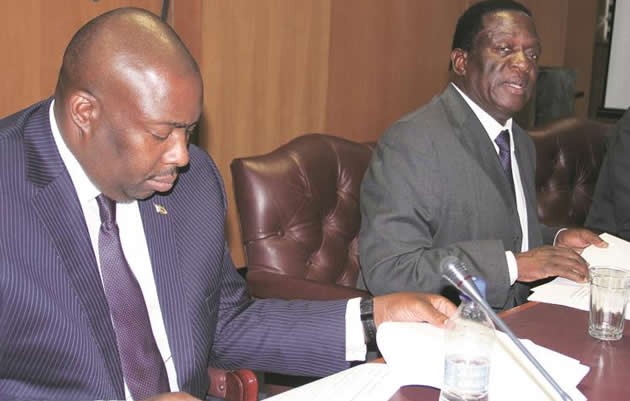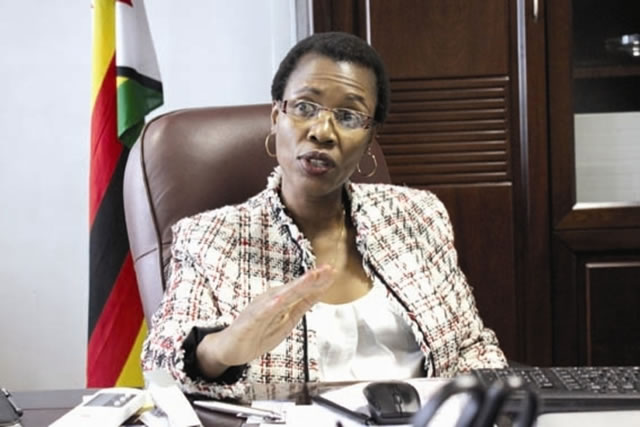Govt seeks $1,5bn for food


Vice President Emmerson Mnangagwa and Local Government, Public Works and National Housing Minister Saviour Kasukuwere address the media at a Press conference on the drought assistance appeal in Harare yesterday.- (Picture by John Manzongo)
Zvamaida Murwira Senior Reporter
Government requires more than $1,5 billion to feed at least three million people up to the next season following the drought that has not only ravaged Zimbabwe but the whole Southern Africa region due to the effects of El Nino, Vice President Emmerson Mnangagwa has said.
VP Mnangagwa said due to the severity of the situation, President Mugabe has declared a state of disaster to pave way for the mobilisation of resources to mitigate the situation.
The VP said this yesterday while addressing journalists, senior Government officials and captains of industry in Harare where he was making a domestic appeal for food assistance.
Read more:
- Sugar shortage looms as drought bites
- Drought hits fertiliser firms
- 16 000 cattle succumb to drought
- Brace for drought: Experts
- Govt, UN join hands to mitigate drought
- Govt moots Plan B for drought
- Drought relief gets underway
VP Mnangagwa said a special Cabinet committee he was chairing was now in place supported by technical structures of Government inclusive of the private sector, faith-based organisations and development partners cascading to community levels.
Its mandate was to put in place a co-ordinated response and early recovery plan.
“The response plan is made up of emergency programmes to address food importation, vulnerable food distribution, emergency water supply, micro-nutrient feeding of the under-fives, emergency irrigation rehabilitation and development, school feeding, livestock and wildlife support all requiring a total of $1 572 009 953,” said VP Mnangagwa.
“I am, therefore, appealing to the private sector, religious and civil organisations and ordinary citizens, inclusive of those in the Diaspora, to rally with Government to support the emergency relief programmes in line with policy which requires that every citizen has a responsibility to avert and/or limit the effects of a national disaster.”
He said the policy required that Government initiates risk reduction measures and take necessary measures to uphold people’s right to life with dignity.
“We are all familiar as a nation with the principle that we are our brother’s and sister’s keeper,” he said.
VP Mnangagwa said the season to date was below normal for 95 percent of the country despite the scattered rainfall that some parts of the country had re- ceived.
He said the situation was critical for Masvingo, Matabeleland South, Matabeleland North and north of Midlands that received less than 50 percent of their normal rainfall.
“This has given rise to devastating impacts on food security, water supplies and livestock pastures. The maize crop condition has been adversely affected with as much as 75 percent write-off in Masvingo and 65 percent write-off in Matabeleland South provinces,” said VP Mnangagwa.
“Approximately 30 percent of the rural population, which is about three million, will be food insecure and require food assis- tance.”
The national picture of food insecurity in order of severity was as follows: Matabeleland North 43 percent, Midlands 33 percent, Masvingo 32 percent, Mashonaland West 30 percent, Matabeleland South 28 percent, Manicaland 27 percent, Mashonaland Central 25 percent and Mashonaland East 22 percent.
“Dam levels are decreasing due to the poor rainfall and the national average is currently 51,1 percent. All the catchment areas are below expected levels for this time of the year except for Manyame and Mazowe. Boreholes are drying up particularly in the southern provinces and 31 percent are non-functional,” he said.
“In general, water for domestic use and livestock watering is in critical shortage in some parts of the country. An alarm has also been sounded over the impact of the drought on various wildlife species in the national parks.”
He said while grazing is expected to improve in areas receiving rains, livestock conditions were still poor and prices had plummeted to unsustainable levels.
“The problem has been compounded by outbreaks of foot- and-mouth disease in some of the affected areas. Cumulative livestock deaths as a result of the drought are currently at 16 681 with Masvingo province being the highest at 6 566,” he said.











Comments